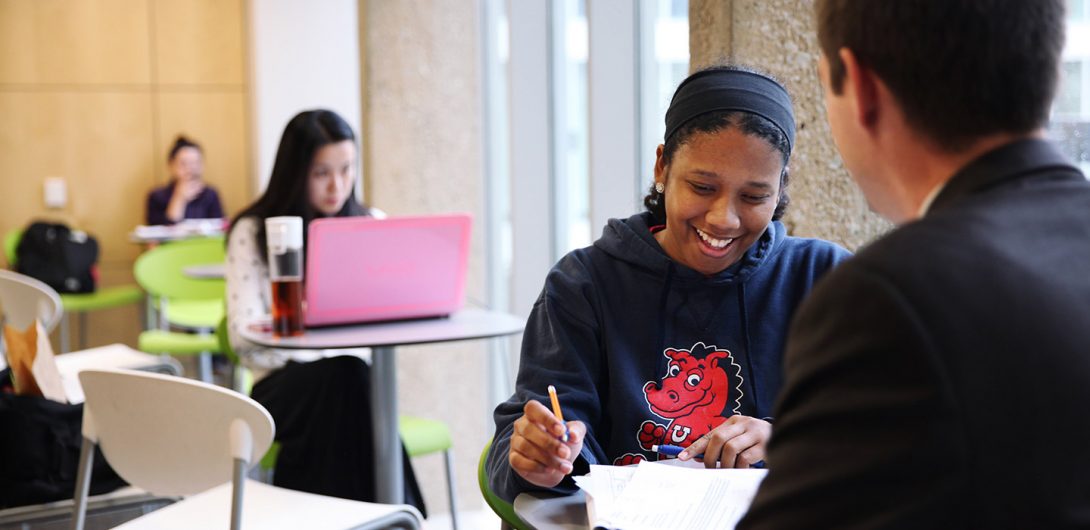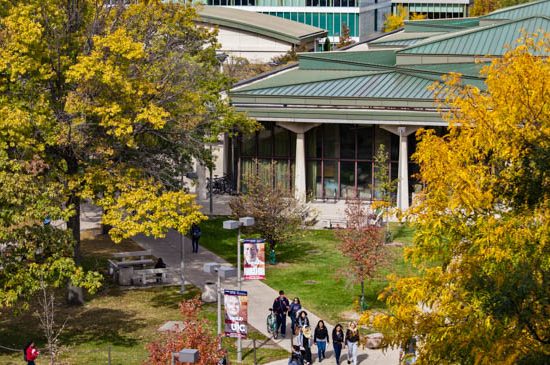Informational Interviews
Interact with LAS professors to build your knowledge
Informational interviews are informal conversations that enable you to connect with professors and ask questions to help you learn more about them or areas related to college or career fields of interest. Informational interviews are an excellent way to build your knowledge and your network. They also provide professors with an opportunity to learn more about you, the kinds of questions that students may have about college or careers, and talk about exciting and meaningful areas.
What you gain from informational interviews

- Insights and advice from a trusted source related to college life, academic departments, research in a field, careers or professional paths, course success strategies, or involvement opportunities on and off-campus
- Professional development in communication (verbal and written), creating thoughtful questions, note-taking, and research skills
- Information that is new and helpful during your time as a college student
- Connections with professors that can lead to future opportunities in research, internships, or scholarships
- Potential mentors who can offer ongoing guidance and support
- Confidence and comfort as you practice interacting with professors
- Knowledge of how to conduct informational interviews that you can use with any professional
How to do informational interviews
how to begin
Before you set off to do an informational interview, you first want to have a goal in mind. What do you hope to accomplish with the informational interview? Are there particular areas that you hope to discuss and learn more about? Some of the areas that you can explore during an informational interview include: college life, academic departments, research in a field, careers or professional paths, course success strategies, or involvement opportunities on and off-campus. Having a sense of your goals and interests in doing an informational interview can help guide your selection of professors to meet with for informational interviews.
Depending on your goals for the informational interview, there are many topics and areas you can discuss with a professor. Browse some of the example areas and questions below to gain key insights and advice about college life, how to be successful, and make the most of your LAS experience.
Example Areas and Questions
Get to know your professor
- What did you major in?
- What did you complete your graduate degree in?
- What kind of activities were you involved in as an undergraduate?
- How long have you been a professor at UIC?
- What strategies were helpful for you in college?
- How did you manage difficult courses?
- Can you tell me about a time you failed and how you handled it?
College Success
- What are some of the strategies I can use to be successful as a college student?
- How can I best prepare for exams?
- What should I do if I have difficulty understanding a concept?
- How should I select a major?
- How can I get involved in the department?
- What are three things that will help me start the semester strong?
- How can I stand out in class?
- How can I feel more confident participating in class discussions or speaking out loud?
Research
- Can you tell me about your current research interests or projects?
- Did you do research as an undergraduate student? Can you tell me about it?
- What are some ways that I can get started in research?
- How do I know what topics to do research on?
- Are you in need of a research assistant or do you know of any professors looking for help?
Graduate School
- Tell me about graduate school. What program did you do?
- When did you start thinking about possibly going to graduate school?
- How did you decide where to apply graduate school? If you were accepted to multiple programs, what criteria helped you decide where to attend?
- How do I know if graduate school is right for me at this time? Should I wait?
- What are some options for paying for graduate school?
- Are there advantages to working and gaining experience before going to graduate school?
- Did you move away for graduate school? If so, how was that experience?
Leadership
- What are some ways to develop leadership skills?
- What does being a leader mean to you?
- What are some spaces or workshops on campus that I can join that will help me develop leadership skills?
- What are some of the ways that you practice leadership skills in your role?
- What kinds of skills are important to be a leader?
- How do you handle difficult situations or conversations?
- How do you overcome challenges or setbacks.
- Is failing part of being a leader?
- Are you involved in any college or campus committees or efforts that involve leadership or driving change?
- Can you tell me about community partnerships?
Careers and Professional Paths
- What kind of careers did you consider before deciding on research and professorship?
- What helped you decide your path?
- How did you talk to your family about your interests, especially if they have different ideas about possible career paths?
- What if I am interested in lots of career paths or industries?
- What are some ways I can get some exposure to help select the best path for me?
- If you weren’t at UIC, what other careers would you consider?
How can I learn professors names and information to help me decide who to contact?
Once you have identified a goal, the next step is to select a professor. There are many ways to learn who professors are in LAS and information about them to help you decide who may be a good fit for an informational interview. You can consider professors you have for courses. You can also learn about professors by visiting your department’s webpage. Each department in LAS has a section where they list the faculty and helpful information about the professors. Most profiles list information on the professor’s research interests or areas, past or current projects, and education.
Do I need to know the professor beforehand to request an informational interview?
Informational Interviews are an excellent way to connect with professors you have met to talk more about areas of interest or connect with a new professor to explore topics of importance. While it can feel strange reaching out to a professor you may not know personally, most professors enjoy spending time interacting with students outside of the classroom and answering questions that will help them get the most of their LAS journey.
How do I ask for an informational interview?
Use the same email below to help request an informational interview. Feel free to change the reason you are interested in meeting!
Dear Professor Jones,
I hope you are doing well! My name is Sara Cano and I am first-year student majoring in Sociology. I recently came across your faculty profile on the department homepage and am interested in learning more about your college and graduate school journey. I wondered if you would be available to meet with me for a brief 20-30 minute conversation? I am on campus Mondays, Wednesdays, and Fridays and could meet anytime from 2-4 PM. We could also meet over Zoom if that works better. Please let me know your thoughts.
Thank you and I look forward to connecting!
Warmly,
Sara Cano
Sara Cano (she/her)
UIN: 1234567
Sociology | Class of 2026
University of Illinois Chicago
How do I prepare for an informational interview?
While informational interviews are meant to be an informal conversation, you always want to be prepared for any conversation or meeting with a professor. That way you can make the most of the meeting and leave a positive impression on the professor. Being prepared also is a way to show that you are professional and respect and value people’s time. Below are some helpful reminders:
- Have a clear goal and purpose for the conversation.
- Take time to learn about the professor by reading their faculty profile available on their department homepage (generally there is a tab labeled “People”). You can also check to see if they have a Linked In profile.
- Write down questions that you would like to ask the professor that relate to your goal.
- Be mindful of time. This means showing up to your meeting when you say and taking only the amount of time you request. You can always ask to meet again to continue the conversation.
- Use proper titles. When writing and communicating with the professor, be sure to address the professor as Professor or Dr.
- If you are meeting in person (rather than online), it can be nice to shake their hand before getting started.
- Introduce yourself before you dive in and remind the professor why you wanted to meet and the areas you hope to discuss.
- At the end of the meeting, be sure to thank the professor and ask if you can stay connected through Linked In.
Post meeting
After you leave the conversation, there are two final steps you can take. The first is to connect with the professor on Linked In if they have a profile and share that it is okay to connect. The second step is to send a brief thank you note. Below is an example.
Dear Professor Jones,
Thank you for meeting with me to talk about your college and graduate school journey. I greatly enjoyed learning more about your experience and appreciate the helpful advice and strategies you shared that will help me, especially as a first-year college student. I hope to stay in contact and look forward to our next discussion!
Thank you again, and have a wonderful day.
Warmly,
Sara Cano
Sara Cano (she/her)
UIN: 1234567
Sociology | Class of 2026
University of Illinois Chicago

Learn from industry professionals
Informational interviews are a transferrable skill and can be used to interview all kinds of professionals, including those in careers or industries of interest. The LAS Career Development and Internships Office has developed a guide to help students connect with professionals and build their network.